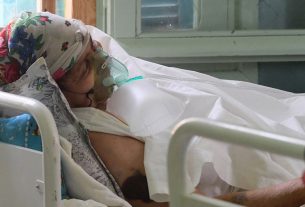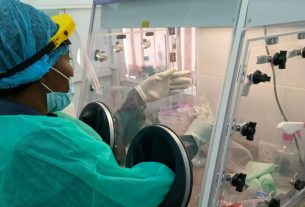Photo: PIUS UTOMI EKPEI / AFP)
Nigerian health technology company Codix Bio Ltd has announced plans to begin large-scale local production of HIV and malaria rapid diagnostic test kits in response to anticipated shortfalls stemming from recent U.S. aid reductions.
The development follows funding cutbacks by the United States Agency for International Development (USAID), which has been a major financier of health interventions in Nigeria. In 2024 alone, USAID allocated $740 million to
Nigeria for programmes including HIV prevention, malaria control, and vaccine delivery. The U.S. remains the world’s largest provider of humanitarian aid, but recent fiscal adjustments have raised concerns over the sustainability of foreign assistance, including to countries like Nigeria.
Speaking in an interview with Reuters, Olanrewaju Balaja, General Manager of Codix Bio, said the company’s new facility in Iperu-Remo, Ogun State, will begin rolling out diagnostic kits before the end of June. The plant, built in partnership with South Korean biotech firm SD Biosensor and supported by the World Health Organisation, will initially produce up to 147 million kits annually, with the capacity to expand beyond 160 million.
Balaja explained that the factory was designed with the specific intention of supporting health programmes previously funded by USAID and PEPFAR. “Based on existing demand statistics for these donor-supported programmes, we believe our current production levels are sufficient to meet Nigeria’s domestic needs,” he said.
While the full implications of the U.S. cuts on Nigerian health systems remain unclear, Codix Bio’s ramp-up in production is seen as a proactive step toward filling emerging supply gaps. According to Balaja, the company’s longer-term goal is to export diagnostic kits to other parts of West and Sub-Saharan Africa, as well as support procurement by international donors such as the Global Fund.
Nigeria continues to bear a significant share of the global disease burden. The World Health Organisation estimates that the country accounts for nearly 27% of malaria cases worldwide. Meanwhile, data from UNAIDS indicates Nigeria has the fourth-largest population of people living with HIV globally.
Balaja emphasised the strategic importance of local production in sustaining health gains, particularly when donor funding is uncertain. “The focus was for us to be able to participate meaningfully in the supply chain for rapid diagnostic kits, especially in light of the roles donor agencies like USAID have historically played,” he said.
The Nigerian government has pledged to mobilise alternative funding to sustain critical health programmes, although details remain limited. For now, companies like Codix Bio are stepping in to maintain the availability of essential diagnostic tools.
The Guardian





